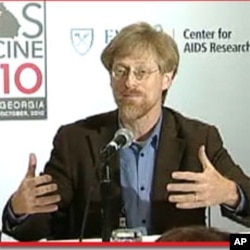Scientists from around the world are meeting in Atlanta, Georgia, this week at the AIDS Vaccine 2010 conference. Besides discussing the latest research, they’re looking for ways to do a better, faster job of finding an effective vaccine to end the pandemic.
Mitchell Warren, head of AVAC, the AIDS Vaccine Advocacy Coalition, says, “This conference is coming at a really interesting time in the search for an AIDS vaccine. We’re almost exactly a year out since we had the report of the success in the Thai prime boost trial (RV144) -- the first evidence of vaccine effect.”
“The study results, representing a significant scientific advance, are the first demonstration that a vaccine can prevent HIV infection in a general adult population and are of great importance,” said UNAIDS and the WHO last September.
Warren says, “It’s fascinating to watch the entire field grappling with the bottom line question: What next?.... I must say, in my mind, (there’s) even more energy in this conference this year than there was a year ago when the results were announced.”
That’s a “good sign” for the (research) field, according to the AVAC leader, “in terms of scientific debate and discovery.”
We know that we don’t know
The mood at AIDS Vaccine 2010 differs from some conferences in years past when it was sometimes difficult for the media to gain access to researchers and their findings.
“I must say there’s a level of reflection going on right now,” Warren says.
That reflection follows the success of the Thai vaccine trials, as well as other recent scientific discoveries regarding HIV.
“And you know what they all tell us? They tell us how much we don’t know. And there is, I think, a humbling going on, recognizing there are great advances…and yet the more we learn the more we realize we’re not entirely sure what to do next,” says Warren.
He sees a greater degree of openness and integration among researchers.
“And I fundamentally believe that that’s how we’ll find an AIDS vaccine, by working slightly broader than we might have thought,” he says.
Speed it up
A year after the Thai vaccine trials showed that a vaccine was indeed possible, what’s being done to follow up on those results?
“The initial result was that it was 31 percent effective,” he says, “an exciting proof of concept, but certainly not good enough for prime time. The biggest question mark is how do you build on that trial and what trial do you do next?”
Follow-up trials are now in the works, but they’re not due to get underway until four years from now.
In addressing the conference this week, Warren said he could sum up his message in three words: Speed it up!
“We frankly look back at this and say, wow, you know, it’s a year since the Thai result. And we’re now only looking at the next large trial in 2014. We have to do better than that,” he says.
That means better planning by researchers, advocates and policymakers.
“Because it’s not good enough to say, ok, we’ll wait four years and kind of plod along. We’ve really got to ramp up this effort in a different way, to be answering questions faster and say how do we go from one result to another result much more quickly?”
The need for an effective vaccine and an effective microbicide was highlighted by Salim Abdool Salim of the University of KwaZulu-Natal. He said for every two people put on HIV therapy, there are five new infections.
Salim headed research into the very promising microbicide CAPRISA 004. It contains the anti-retroviral drug Tenofovir. Further trials on the microbicide are planned.




